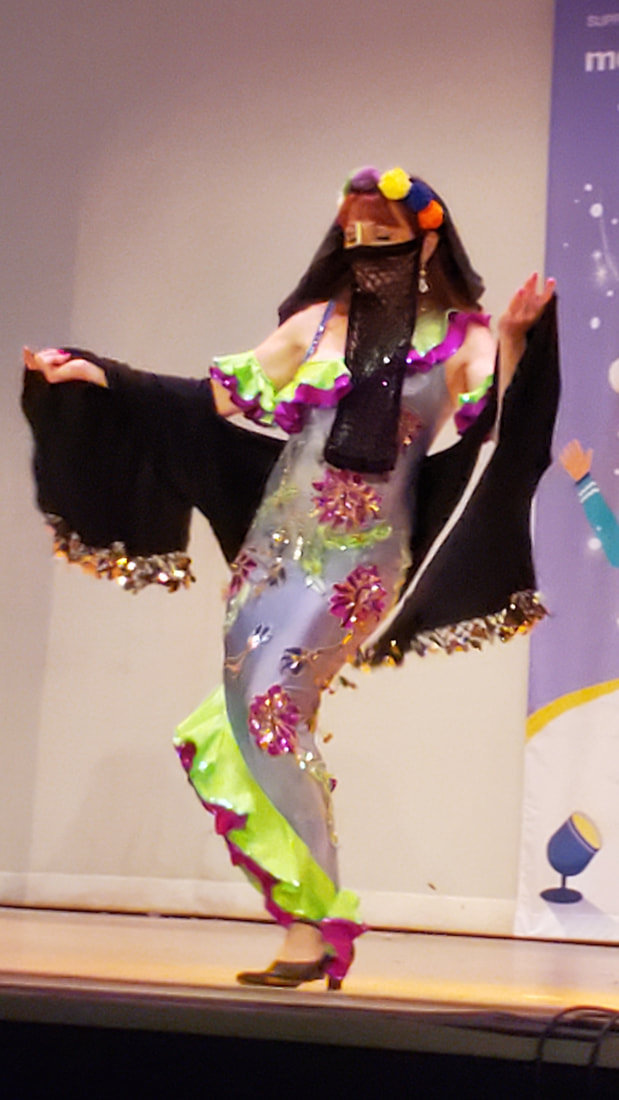|
Some of us naturally love to study history, and some of us don’t. When I was in grammar school, it was my least favorite class, mostly because of the way it was presented. It was memorizing a name, a place and a date (ie, John Doe discovered something in a specific year). Boring! I just could not see the value of the dry material. Of course, as I got older and literally lived history and even created some of it within our beloved world of belly dance, my opinion changed. The subject of oriental dance is a passion of mine (in case you couldn’t tell! LOL). I used to ask my teachers, my mentors, and the musicians I worked with all kinds of questions about the dance, the culture, the music, etc. I collected whatever books I could find on the topic of belly dance…and for a long time, they were books that only tried to teach movements, not offering much about the history. When the internet arrived, I was one of the first dancers to publish online articles about oriental dance. Since then, the internet has exponentially evolved into a vast source of information. After 40+ years of being involved in oriental dance, I can look back on the decades with hindsight. That timeline shows me how I came to be a successful artist. Without studying our dance history, past and present, I could never have earned a full-time living from dance and could never have appreciated the value of our dance as an art form. When you explore how our dance came to be, you will learn to appreciate the depth of the culture, its traditions and its evolution. You will see how dance, music, art and fashion are intertwined. They are the ways a culture expresses and communicates FEELING. Here are some reasons why belly dancers should study Middle Eastern dance history:
Why is emotional expression important? Anyone can learn to be an excellent technician of Middle Eastern dance. While their movements are beautifully executed, their performance will feel empty to the audience without the ability to emote. Dance is meant to be an emotional experience for both the performer and the audience. Every audience seeks a performer that shares their passion. Great dancers provoke an emotional response, whether good or bad. What they never want is no response at all. Neutrality means the audience does not care about what they just experienced, and they will leave the show with a feeling of apathy. The dancer who successfully connects with their audience on an emotional level experiences a wonderful side effect. You are creatively stimulated by the audience’s reactions and then will dance even better. After the show, you will feel an unparalleled ‘high’ that is rewarding and exciting. Once you experience it, you will seek that ‘high’ every time you perform. Folkloric dances are ‘character’ dances, in which you play a role. For example, take an Alexandrian Melaya dance. In this theme, you play the woman who goes to market in the port city of Alexandria. You are wearing a dress, a scarf on your head, a burka on your face, and are wrapped in a black opaque garment called a melaya. The dance is telling a story, where you go to the market and engage in an innocent flirtation with a sailor. You are dancing in a gently enticing way, being playful, sweet, and rather shy, but trying to flirt at the same time. Playing this role, you must project with your body language and facial expressions. Perfecting a folkloric dance, you will build your skills to express various emotions whenever you dance oriental dance, too. Below is a photo of me in a Melaya costume. For an example of a Melaya dance, please take a look at this YouTube video clip from my YouTube channel of me in a classroom (not in costume) so that you can see the style of movements and hear an example of the music: https://youtu.be/2uX4LglVCss Folkloric dances are fun to learn and can easily be adjusted from a solo to a duet or group dance. Middle Eastern folklore and history are invaluable to the belly dancer that wants to be the best dancer she can be! Enjoy your research.
0 Comments
Leave a Reply. |
JASMIN JAHAL, AuthorI've been dancing since I was 3 and a professional belly dancer for over 40 years. I've learned so much from personal belly dance experience and want to share with you advice, tips, suggestions and more. Anytime you have any questions and need sage advice, please reach out and let me hear from you! Archives
June 2022
Categories |

 RSS Feed
RSS Feed